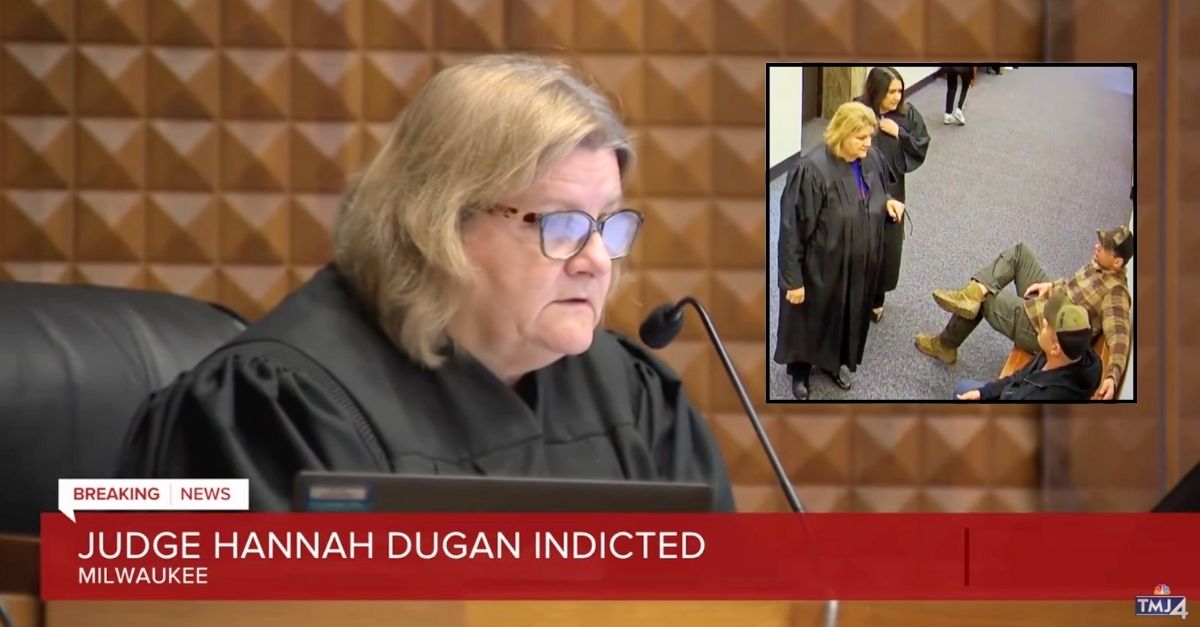
Background: Milwaukee County Judge Hannah Dugan in court (WTMJ/YouTube). Inset: Surveillance video shows Milwaukee County Judge Hannah Dugan speaking with ICE agents before Eduardo Flores-Ruiz’s detainment (WDJT/YouTube).
Milwaukee County Judge Hannah Dugan cannot claim immunity from criminal charges for allegedly obstructing ICE agents, a federal judge in Wisconsin ruled on Tuesday. Dugan was indicted on federal charges for allegedly impeding agents during an immigration enforcement operation and cannot escape prosecution “simply because she encountered federal agents while working at the courthouse,” the ruling states, and must now stand trial.
“There is no basis for granting immunity simply because some of the allegations in the indictment describe conduct that could be considered ‘part of a judge’s job,'” wrote U.S. District Judge Lynn Adelman in his 27-page ruling, which was handed down Tuesday in the Eastern District of Wisconsin. “In other words, they are all ‘official acts,'” Adelman said.
Adelman, a Bill Clinton appointee, noted that Dugan argued that immunity for judges is not restricted to the civil sphere and it “protects against criminal liability for most official acts.” Meanwhile, the Justice Department contends that even if a doctrine of immunity for judicial acts existed, the evidence in this case shows that Dugan “went well beyond her judicial role.”
According to Adelman, the events surrounding Dugan’s case “arose from her unilateral, nonjudicial, and unofficial actions outside the role of a Wisconsin state judge by obstructing a federal immigration matter over which she had no authority.”
“Although the magistrate judge allowed that some of the allegations described conduct that could be considered part of a judge’s job, she clarified that defendant was not being prosecuted for opining on the fly, managing her courtroom, or allowing someone to appear by Zoom,” Adelman explained. “Rather, the indictment charged specific violations of federal criminal laws.”
Love true crime? Sign up for our newsletter, The Law&Crime Docket, to get the latest real-life crime stories delivered right to your inbox.
Dugan, 66, is accused of helping an undocumented immigrant evade federal officers shortly after he appeared in her Milwaukee County Circuit courtroom on domestic abuse charges. She filed a motion in May seeking to have the federal obstruction charges dismissed, arguing that — like presidential immunity for official acts — she benefits from broad judicial immunity.
Since then, prosecutors and defense attorneys filed competing arguments on whether the case should proceed. Dugan’s 30-page filing on July 15 alleged she was being prosecuted “for doing her job, not in the way that some federal agents preferred, true, but her job all the same.” The Justice Department responded with a filing of its own, which rebuked Dugan’s claims and mocked her for explaining them in a “gerrymandered way,” per the DOJ.
“Dugan’s assumption of immunity wrongly inverts the analysis on a motion to dismiss charges that are properly pled in an indictment,” federal prosecutors said. “Even in her view, criminal prosecutions of state judges are undisputedly permitted in certain circumstances. However, this does not in any way imply the creation of categories where prosecutions are forbidden in other circumstances.”
Adelman said in his Tuesday ruling that the dispute ultimately “boils down” to one thing.
“[Dugan] posits a general rule of immunity, subject to certain exceptions which account for the previous (and legitimate) prosecutions of judges,” Adelman said. “According to the government, there is no general rule of immunity, and what defendant calls exceptions are simply examples of the types of prosecutions that have been brought against judges. A review of the relevant history reveals the government has the better of the argument.”
Dugan’s lawyers have condemned her prosecution as “far-fetched,” while the DOJ insists she is using “amorphous and contestable distinctions” to prop up her arguments.
In the July 15 filing, Dugan’s attorneys claimed that if the case proceeded, state and federal judges would be “vulnerable” to prosecution by the federal executive “any time they handle a trial involving contraband in evidence or schedule a hearing in ways that inconvenience — and thus arguably impede — federal officers.”
That same month, U.S. Magistrate Judge Nancy Joseph issued a recommendation to Adelman. Joseph stated that while judges are largely immune in civil cases for official actions, no such judicial immunity exists in criminal prosecutions. Prosecutors said they believed Joseph’s recommendation was correct and that Dugan’s objection would not provide a “sound reason” to dismiss her indictment.
“Accepting her claim about the nature of her prosecution would require fact-finding, which is untenable on a motion to dismiss, a principle that the magistrate judge followed and to which Dugan has not objected,” the DOJ said.
Dugan’s lawyers did not respond to Law&Crime’s requests for comment Tuesday.

